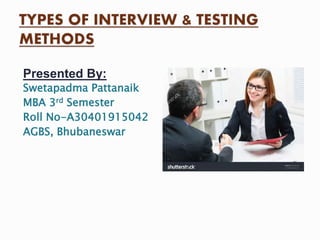
Types of interviews & testing methods
- 1. Presented By: Swetapadma Pattanaik MBA 3rd Semester Roll No-A30401915042 AGBS, Bhubaneswar
- 2. The term interview has been derived from the French word entre voir that means to glimpse or to see each other. By definition it means a meeting for obtaining information by questioning a person or persons.
- 3. Basically ,an interview is a conversation between two people (the interviewer and the interviewee) where questions are asked by the interviewer to obtain information from the interviewee.
- 4. An interview has two purposes :- To find if the candidate has the right attitude and fits the requirement and company culture To find the best candidate to fill a vacancy
- 5. Who you are as a person Your knowledge Your skills Your attitude Your ability to interact with people Your capacity to take work pressure
- 6. BASIS CLASSIFICATION ACCORDING TO STRUCTURE CLASSIFICATION ACCORDING TO THE PURPOSE CLASSIFICATION ACCORDING TO INTERVIEW’S CONTENT CLASSIFICATION ACCORDING TO ADMINISTERING THE INTERVIEW
- 7. 1. STRUCTURED OR DIRECT INTERVIEW The questions and acceptable responses are specified in advance Responses are rated for appropriateness of content Also called standardized interviews as they are pre planned to a high degree of accuracy and precision
- 8. 2. UNSTRUCTURED OR INDIRECT INTERVIEW OR OPEN-ENDED INTERVIEW Not directed by questions or comments as to what the candidate should be asked No set format is followed Candidate is encouraged to express himself on any topic of his interest, his expectations, background etc. Interviewers look for traits of character and nature of his aspirations, strengths, weaknesses, potential etc.
- 9. 3. SEMI-STRUCTURED INTERVIEW Specific topic areas A general set of questions But the interview flows like a conversation and topics are covered as they come up.
- 10. 1. STRESS INTERVIEW This type of interview is rare in the present job scenario. It was a very common interview method when selecting for sales position.
- 11. Being asked more than one question at a time; Being asked further questions without being allowed adequate time to respond; The interviewer adopts a hostile behavior and deliberately puts the candidate on defensive by trying to annoy, embarrass or frustrate him; He asks questions rapidly, criticizes his/her answers, interrupts him/her frequently, makes derogatory remarks etc.
- 12. This interview is an attempt to see how the candidates handle themselves under stress. So, the interviewer deliberately assumes a sarcastic or argumentative position. The trick for the interviewee is to remain calm under such a situation.
- 13. 2. APPRAISAL/ ASSESSMENT INTERVIEW A discussion following a performance appraisal In which the supervisor and employee discuss the employee’s rating and Possible remedial actions to be taken.
- 14. 3. EXIT INTERVIEW When an employee leaves the company for any reason, an exit interview is conducted Aims at eliciting information about the job or related matters Help the employer in having a better insight into what is right or wrong about the company Highlights the work of an HR Manager
- 15. 1. ONE TO ONE INTERVIEW Single interviewer who takes interview one by one Maybe structured, unstructured or sequential Easier to handle, generally more informal Best way to handle such interviews is to relate them as a form of a conversation
- 16. 2. SEQUENTIAL/SERIAL INTERVIEW These interviews are Those in which the applicant is interviewed Sequentially by several persons (interviewers) Each one rates the applicant on a standard evaluation form and these ratings are then compared before the hiring decision is taken Each interviewer rates from his/her own point of view, asks different questions and forms an independent opinion of the candidate
- 17. 3. GROUP INTERVIEW/ GROUP DISCUSSION The main purpose of this interview is to see how the interviewee interacts with others and how he/ she influences others with his/her knowledge and reason. Also known as GD’s, a topic for discussion is given to a group.
- 18. 4. PANEL INTERVIEW/ COMMITTEE INTERVIEW A panel interview comprises more than two members interviewing a person for the hiring. It is most common mode of interview when hiring at the senior level. The interviewee should try to connect with each interviewer and the best way to do this is to read the personality of each interviewer.
- 19. Panel Interview
- 20. Aptitude tests Skills and knowledge tests Personality assessments
- 21. About the company, history, employment and position in the industry Competitors Products and services Global presence Publications, blogs, presence in social media, analysts’ review Finances of the company The position you have applied for Requirements of the specific position
- 22. DOs DON’Ts Groom yourself well Do not demonstrate overconfidence Show enthusiasm Do not answer before the question has been completed Carry extra copies of your resume Do not talk continuously Wear a cheerful smile Do not be rude or get into an argument with the interviewers Be polite, assertive and firm Do not fiddle with your tie or pen Be genuine and truthful when you reply Do not extend your hand first for a handshake Look into the eyes of the interviewer while talking to him/her Do not be unclear about your expectations from the job
- 23. Tell me something about yourself. What are your hobbies ? Why did you do your MBA after graduation ? Which is the most recent book that you have read ? Have you heard about …. (a current topic) ? What will you do if you reach office one morning and find out that you have lost your job ? What was your role in your previous company ? Where do you see yourself two years down the line ? What are your expectations from the job ? What are your strengths and weaknesses ? Give us an example of an adverse situation at work and how you tackled it ?
